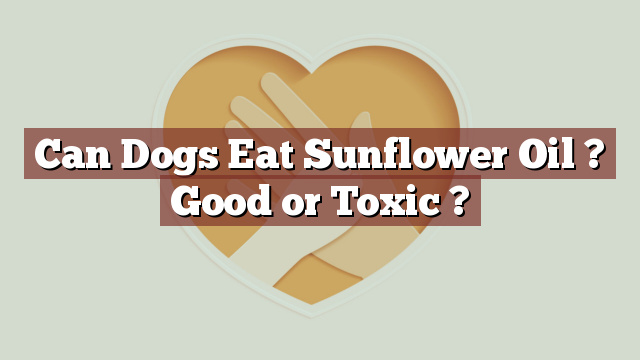Can Dogs Eat Sunflower Oil? Good or Toxic?
Knowing which foods are safe for our pets is crucial for their well-being. In this article, we will explore whether dogs can safely consume sunflower oil.
Nutritional Value of Sunflower Oil for Dogs
Sunflower oil is derived from the seeds of sunflower plants and is commonly used in cooking and as a dietary supplement. It is rich in essential fatty acids, such as omega-6, which play a vital role in maintaining a healthy coat and skin for dogs. Additionally, sunflower oil contains vitamin E, which acts as an antioxidant and helps support the immune system.
Is Sunflower Oil Safe or Toxic for Dogs?
Yes, dogs can safely consume sunflower oil in moderation. In fact, many commercial dog foods contain sunflower oil as an ingredient due to its nutritional benefits. However, it is important to note that while sunflower oil itself is safe for dogs, certain additives or cooking methods may render it harmful. For example, if the oil has been flavored with garlic or onion, it could be toxic to dogs. Always ensure that the sunflower oil you are offering to your canine companion is pure and without any harmful additives.
Potential Risks or Benefits of Sunflower Oil for Dogs
When given in moderation, sunflower oil can provide several benefits to dogs. The essential fatty acids present in sunflower oil can help reduce inflammation, promote a healthy coat, and alleviate dry skin issues. Additionally, the vitamin E content in sunflower oil can support the immune system and protect against free radicals.
However, it is important to note that excessive consumption of sunflower oil can lead to weight gain and digestive issues in dogs. Therefore, it is crucial to offer sunflower oil as part of a balanced diet and in appropriate portions.
What to Do if Your Dog Eats Sunflower Oil
If your dog accidentally consumes an excessive amount of sunflower oil, it is important to monitor their behavior and look out for any signs of discomfort or distress. Common symptoms of gastrointestinal upset may include diarrhea, vomiting, or loss of appetite.
If you notice any concerning symptoms or if your dog has ingested a large quantity of sunflower oil, it is recommended to consult your veterinarian for further guidance. They will be able to assess the situation and provide appropriate advice or treatment if necessary.
Conclusion: Sunflower Oil Can Be Safe for Dogs in Moderation
In conclusion, sunflower oil can be a safe and beneficial addition to a dog’s diet when given in moderation. Its nutritional components, such as essential fatty acids and vitamin E, can support a healthy coat, skin, and immune system. However, it is crucial to ensure that the sunflower oil offered to dogs is free from any harmful additives and is given in appropriate portions.
As responsible pet owners, it is essential to always be aware of the foods that are safe for our furry friends. While sunflower oil can provide certain benefits, it is important to remember that a balanced diet, regular exercise, and consulting with a veterinarian are key factors in maintaining our dogs’ overall health and well-being.
Thank you for investing your time in exploring [page_title] on Can-Eat.org. Our goal is to provide readers like you with thorough and reliable information about various dietary topics. Each article, including [page_title], stems from diligent research and a passion for understanding the nuances of our food choices. We believe that knowledge is a vital step towards making informed and healthy decisions. However, while "[page_title]" sheds light on its specific topic, it's crucial to remember that everyone's body reacts differently to foods and dietary changes. What might be beneficial for one person could have different effects on another. Before you consider integrating suggestions or insights from "[page_title]" into your diet, it's always wise to consult with a nutritionist or healthcare professional. Their specialized knowledge ensures that you're making choices best suited to your individual health needs. As you navigate [page_title], be mindful of potential allergies, intolerances, or unique dietary requirements you may have. No singular article can capture the vast diversity of human health, and individualized guidance is invaluable. The content provided in [page_title] serves as a general guide. It is not, by any means, a substitute for personalized medical or nutritional advice. Your health should always be the top priority, and professional guidance is the best path forward. In your journey towards a balanced and nutritious lifestyle, we hope that [page_title] serves as a helpful stepping stone. Remember, informed decisions lead to healthier outcomes. Thank you for trusting Can-Eat.org. Continue exploring, learning, and prioritizing your health. Cheers to a well-informed and healthier future!

